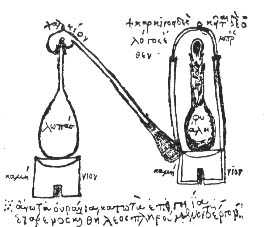Alchemy
Alchemy is an ancient practice that combines elements of chemistry, metallurgy, physics, medicine, astrology, semiotics, mysticism, spiritualism, and art. It is best known for its practitioners' attempts to turn lead into gold, a quest known as the search for the Philosopher's Stone. Alchemy has been practiced in various cultures and civilizations throughout human history, including in Ancient Egypt, the Islamic Golden Age, and Medieval Europe. Its principles and practices have significantly influenced the development of modern science and medicine, despite often being considered pseudoscience due to its mystical and secretive nature.
History[edit | edit source]
The origins of alchemy can be traced back to Hellenistic Egypt, with the blending of Greek philosophy, Egyptian technology, and Middle Eastern magic. The word "alchemy" itself is derived from the Arabic word al-kīmiyā’, borrowing from the Greek word khemeia meaning "to pour" or "to cast a metal". The practice spread through the Islamic world after the fall of Alexandria, becoming integrated with Islamic science and culture during the Islamic Golden Age. Islamic alchemists made significant contributions to chemical technologies and the philosophical underpinnings of alchemy.
In the Middle Ages, alchemy spread to Europe, where it flourished until the 17th century. European alchemists continued the search for the Philosopher's Stone and the Elixir of Life, substances believed to grant eternal life and to convert base metals into noble metals. The work of these alchemists paved the way for modern chemistry, laying the groundwork for the scientific method and contributing to the discovery of new elements and the development of laboratory equipment.
Philosophy[edit | edit source]
The philosophy of alchemy is based on the theory of the four elements (fire, water, air, and earth) and the belief in a universal spirit present in all matter. Alchemists also believed in the concept of macrocosm and microcosm, suggesting that the same patterns are found in all levels of the cosmos, from the largest scale (macrocosm) to the smallest scale (microcosm). This belief is encapsulated in the famous alchemical maxim "As above, so below".
Alchemy's goals were not merely material but also spiritual. Practitioners sought personal purification, enlightenment, and the unification of opposites (such as the masculine and feminine principles) in the quest for spiritual transformation and the achievement of the Magnum Opus, or Great Work.
Influence on Science and Medicine[edit | edit source]
While alchemy is often remembered for its contributions to the development of early chemistry and metallurgy, its influence on medicine should not be underestimated. Alchemical texts contained early forms of the scientific method, as well as descriptions of laboratory apparatus that would become standard in scientific research. Moreover, the alchemical tradition contributed to the birth of pharmacology through the development of medicines and chemical remedies.
Modern Perspectives[edit | edit source]
Today, alchemy is viewed through various lenses. Historians of science consider it a precursor to modern science, particularly chemistry. In psychology, Carl Jung interpreted alchemy as a symbolic process of individuation, with the alchemical transmutation serving as a metaphor for personal transformation. In popular culture, alchemy remains a subject of fascination, often depicted in literature, film, and television as a mystical or magical practice.
See Also[edit | edit source]
This article is a philosophy-related stub. You can help WikiMD by expanding it!
Transform your life with W8MD's budget GLP1 injections from $125
W8MD offers a medical weight loss program NYC and a clinic to lose weight in Philadelphia. Our W8MD's physician supervised medical weight loss centers in NYC provides expert medical guidance, and offers telemedicine options for convenience.
Why choose W8MD?
- Comprehensive care with FDA-approved weight loss medications including:
- loss injections in NYC both generic and brand names:
- weight loss medications including Phentermine, Qsymia, Diethylpropion etc.
- Accept most insurances for visits or discounted self pay cost.
- Generic weight loss injections starting from just $125.00 for the starting dose
- In person weight loss NYC and telemedicine medical weight loss options in New York city available
- Budget GLP1 weight loss injections in NYC starting from $125.00 biweekly with insurance!
Book Your Appointment
Start your NYC weight loss journey today at our NYC medical weight loss, and Philadelphia medical weight loss Call (718)946-5500 for NY and 215 676 2334 for PA
Search WikiMD
Ad.Tired of being Overweight? Try W8MD's NYC physician weight loss.
Semaglutide (Ozempic / Wegovy and Tirzepatide (Mounjaro / Zepbound) available. Call 718 946 5500.
Advertise on WikiMD
|
WikiMD's Wellness Encyclopedia |
| Let Food Be Thy Medicine Medicine Thy Food - Hippocrates |
Translate this page: - East Asian
中文,
日本,
한국어,
South Asian
हिन्दी,
தமிழ்,
తెలుగు,
Urdu,
ಕನ್ನಡ,
Southeast Asian
Indonesian,
Vietnamese,
Thai,
မြန်မာဘာသာ,
বাংলা
European
español,
Deutsch,
français,
Greek,
português do Brasil,
polski,
română,
русский,
Nederlands,
norsk,
svenska,
suomi,
Italian
Middle Eastern & African
عربى,
Turkish,
Persian,
Hebrew,
Afrikaans,
isiZulu,
Kiswahili,
Other
Bulgarian,
Hungarian,
Czech,
Swedish,
മലയാളം,
मराठी,
ਪੰਜਾਬੀ,
ગુજરાતી,
Portuguese,
Ukrainian
Medical Disclaimer: WikiMD is not a substitute for professional medical advice. The information on WikiMD is provided as an information resource only, may be incorrect, outdated or misleading, and is not to be used or relied on for any diagnostic or treatment purposes. Please consult your health care provider before making any healthcare decisions or for guidance about a specific medical condition. WikiMD expressly disclaims responsibility, and shall have no liability, for any damages, loss, injury, or liability whatsoever suffered as a result of your reliance on the information contained in this site. By visiting this site you agree to the foregoing terms and conditions, which may from time to time be changed or supplemented by WikiMD. If you do not agree to the foregoing terms and conditions, you should not enter or use this site. See full disclaimer.
Credits:Most images are courtesy of Wikimedia commons, and templates, categories Wikipedia, licensed under CC BY SA or similar.
Contributors: Prab R. Tumpati, MD






